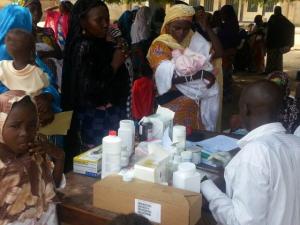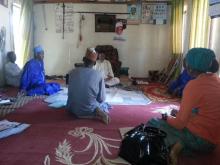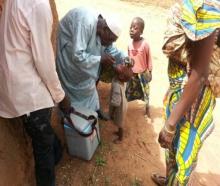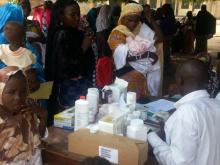Chibok: WHO facilitates revitalization of the health system of a ravished community
Maiduguri, 24 May 2015 - The abduction of the Chibok school girls of Borno State in April 2014 brought the erstwhile quiet community into international limelight while at the same time creating a major health deficit in the lives of the people. The attack left the community ransacked, with all of the 18 health facilities in the Local Government Area (LGA) devastated and incapable of providing the most basic healthcare services. Health workers abandoned their posts for fear of attacks, lack of access into and out of the community and the absence of any dependable security network.
Initially, Chibok LGA was one of the low risk LGAs in the state according to the National Primary Healthcare Development Agency (NPHCDA) classification. The extant insecurity transformed it into one of the highest risk LGAs for vaccine preventable diseases in Borno. As a consequence of the security challenges, the LGA stopped implementation of all primary healthcare delivery services, including polio eradication and routine immunization, resulting in wide immunity gaps among children.
“Surviving in this community at the peak of the insurgency was akin to living in hell. We felt like animals being hunted and killed at will” says Aji Maina, District Head of Whuntaku. He lamented “there was not a single functional health facility in this whole local government then. We simply resorted to the use of traditional medicine to treat the sick and wounded. May God never put us through such terrible experiences again”.
Revitalization of the healthcare system
However, since mid-2015, life in Chibok is gradually returning to normal. From zero functional health facilities, 14 have been rehabilitated, re-equipped and reopened. WHO and other partner agencies provided refresher training to the health workers prior to their posting to the various health facilities.
At present, 14 of the hitherto 18 non-functional health facilities in the LGA offer health services including maternal and reproductive health services to the population. Already, routine immunization services across the 11 political wards have been strengthened. Based on available data, the LGA has achieved OPV3 and Penta3 coverage of 95% and 93% respectively while coverage for IPV and measles stand at 79% and 69% respectively, representing one of the highest coverage for routine immunization in the state as at April this year. The under 1 year old target is 5,389 and pregnant women are 6,736.
“Before now, we used to feel abandoned. We had no access to any form of healthcare services. Now our clinics are working and helping to keep us and our women and children healthy” Mrs Ladi Filibus, a mother of three, revealed.
Immunization with tact
Dr Saidu Mahmood, the WHO State Coordinator in Borno explained that, “the implementation of house-to-house polio campaigns ceased soon after the abduction of the school girls but resumed erratically in November 2014 using the hit-and-run strategy due to persisting security challenges”. However, with improvement in security in the LGA, SIAs and routine immunization have since commenced in earnest. Vigilantes are engaged to provide security for personnel working in hard-to-reach and mountainous settlements located in Kautikari, Koronglum, Pemi and Kuburumbula wards.
With a target population of 26,942 under five year old children, independent monitoring and LQAs results have consistently revealed high quality campaigns. From January through May this year, the LQAS results for the LGA ranges from 97% to 98% coverage. Commenting on the quality of immunization coverage in the LGA, the district head of Mbalala, Alhaji Waziri Wadir said “our people are very compliant to all government programmes. We have never refused immunization or any health programme aimed at helping the people”.
There is enormous support from traditional leaders in ensuring the success of all planned immunization activities. They attend supplemental immunization planning meetings at the LGA. Representatives of security personnel also sit through the meetings to provide security guidance. Trainings and social mobilization activities are also conducted with the participation of all stakeholders. During IPDs, traditional leaders and security personnel play important roles in ensuring quality campaigns.
Established surveillance system that defied insecurity
To strengthen surveillance, WHO established 6 focal sites across the LGA with a surveillance target population of 43,959. Designated surveillance focal persons and over 20 community informants were retrained to improve AFP and other priority diseases timely detection and reporting. While in 2015 only three (3) cases of AFP were reported, in the current year six (6) cases have been reported so far. All cases have been confirmed as negative for polio virus.
______________________________
For more information, please contact:
Technical contacts:
Dr Fiona Braka; Tel: +234 703 170 5252; Email: brakaf [at] who.int (brakaf[at]who[dot]int)
Dr Abdelrahim Khalid; Tel: +234 803 402 1284; Email: abdelrahimk [at] who.int (abdelrahimk[at]who[dot]int)
Media contacts:
Ms Charity Warigon; Tel: +234 810 221 0093; Email: warigonc [at] who.int (warigonc[at]who[dot]int)
Dr Umar Mustapha; Tel: +234 803 616 9972; Email: umarm [at] who.int (umarm[at]who[dot]int)
______________________________
Below:
01 Health camp for treating minor ailments in Chibok, Borno State
02 Advocacy meeting with the district head of Mbalala in Chibok
03 Hit-and -run team vaccinating a child at Whuntuku community of Chibok






